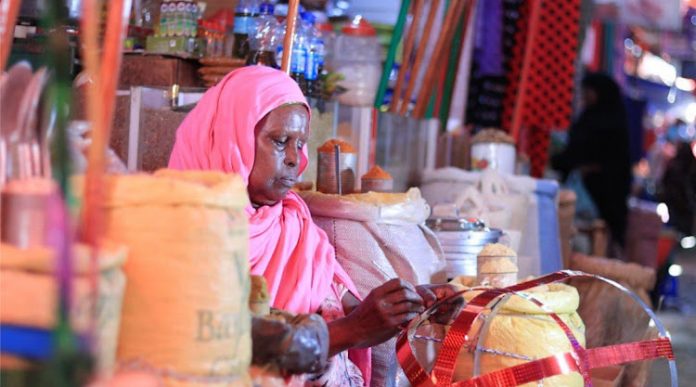With operations in Kenya, the two are keen to grow businesses in the region
Africa’ s money transfer company, Dahabshiil through its subsidiary MicroDahab micro finance institution, has partnered with the Africa Enterprise Challenge Fund (AECF) to support SMEs in Somalia regions.
Ripple effects are expected to be felt in Kenya, which exported goods worth Sh11.4 billion to the neighbouring country last year— Economic Survey 2021.
Funded by the European Union, the programme aims at promoting women, youth and agricultural producer groups .
MicroDahab MFI has matched EU’s and AECF funding of $1 million (about Sh110.4 million) which will all go into providing financing for investment by small businesses.
The project is under the aegis of the Finance for Inclusive Growth in Somalia.
The Finance for Inclusive Growth in Somalia (FIG-Somalia) programme aims to connect women- and youth-owned businesses and producers to financial institutions, allowing them to access financing and technical support.
It comes about two months since Kenya and Somalia agreed to reset their bilateral relations, expected to open up trade between the two countries, with President Uhuru Kenyatta Uhuru reiterating the importance of stability in national and regional development.
Uhuru said economic growth is only possible in a peaceful environment.
It is envisaged that the FIG-Somalia programme will reach nearly 8,000 beneficiaries and will create up to 4,800 decent jobs; 40 per cent of the programme targeted beneficiaries are expected to be women entrepreneurs.
FIG-Somalia is a pilot programme component under the European Union’s Inclusive Local and Economic Development (ILED) programme, whose objective is to contribute to stability in Somalia by extending state authority and services, promoting local reconciliation and peacebuilding, creating inclusive economic opportunities and protecting the most vulnerable.
Kenya is a key player in helping Somalia regain stability, through the AMISOM.
The objective of FIG Somalia is to revitalize and expand the local economy with a focus on livelihood enhancement, job creation and broad-based inclusive growth for Somali women, youth and producer groups.
“The AECF is pleased to have MicroDahab MFI as part of our transformational program in Somalia. We believe that this program will reduce challenges that non-bankable populations in Somalia face when they need capital support for their businesses,” Victoria Sabula, CEO of the AECF, said.
“We also hope that this new access to banking services will provide financial freedom for women and youth in Somalia,” Sabula added.
Formed in 2014 as a subsidiary company of the Dahabshiil Group, MicroDahab is a microfinance institution that operates across the Somali regions creating employment opportunities for the youth, women, productive sector, and small-medium micro enterprises (SMMEs).
Many of microdahab’s clients are young entrepreneurs, most of them being women, who venture in farming, fishing, agriculture, livestock, and dairy, among many others.
Microdahab does not require any collateral from its female clients and self-help groups don’t need to provide a third-party guarantor. This is a unique attribute that differentiates them from banks.
Dahabshiil group chief executive officer, Abdirashid Duale said: “We introduced products to transform the lives and fortunes of many communities in a socially responsible yet sustainable way. And it works well because the beneficiaries can access the money electronically on their phones through E-Dahab services.”
As part of its corporate social responsibility, Dahabshiil set up microdahab, a microfinance institution to help small-scale business people to build their status in business.
“Microdahab is Dahabshiil’s group’s way of giving back to the communities,” Duale says.
The MicroDahab MFI is meant to stimulate private sector entrepreneurs to innovate and find profitable ways of improving access to markets and the way markets function for the poor, particularly in rural areas.
Dahabshiil plays a critical role in remittances to Kenya, mainly inflows from the Middle East.
AECF on the other hand has been supporting Kenyan businesses to reach off-grid rural communities with low-cost, clean energy products and services.
By providing patient capital in the forms of grants and zero-interest loans to a carefully selected portfolio of companies, AECF has been able to contribute to enhanced energy access for over 700,000 off-grid households, create jobs and opportunities for young people.
The Covid-19 pandemic however threatens to reverse this progress and increase energy poverty and inequality across Kenya.
“Supply chains and distribution networks have been restricted by lockdowns, curfews, and social distancing measures. Rural customers are struggling with steep decreases in income and cannot afford even micro-payments to access lighting for their homes,” it notes.
The Star Ke




























